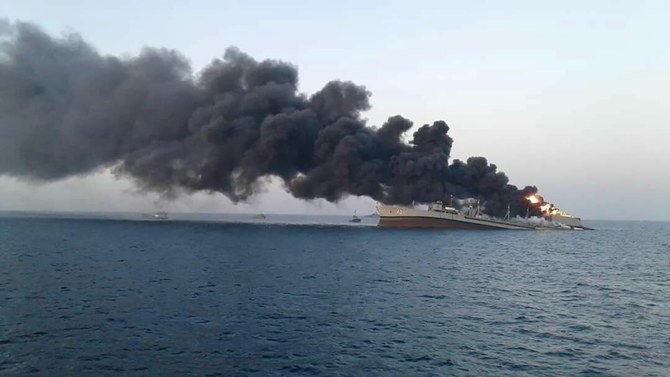JEDDAH: More than 400 troops were forced to jump for their lives on Wednesday when an Iranian warship burst into flames and sank to the bottom of the Gulf of Oman.
Hours later a massive fire broke out after an explosion at the oil refinery serving Tehran, sending thick plumes of black smoke over the Iranian capital.
Authorities at the state-owned Tondgooyan Petrochemical Company dismissed suggestions of sabotage, but both incidents sparked speculation about another round in the tit-for-tat shadow war between Iran and Israel.
The fire on board the Kharg, a 207-meter vessel used to resupply other ships at sea and conduct training exercises, broke out in the early hours of Wednesday. Trainee cadets and the ship’s crew jumped to safety wearing life jackets, as flames and thick, black smoke rose into the sky behind them.
The vessel sank near the Iranian port of Jask, about 1,270 km southeast of Tehran on the Gulf of Oman near the Strait of Hormuz.
The Kharg had been the largest naval warship in the Iranian fleet until January, when naval chiefs converted the oil tanker Makran for use as a mobile launch platform for helicopters.
However, the Makran is not as useful as the Kharg, which could handle both refueling and replenishing supplies of ships at sea, said Mike Connell of the Center for Naval Analysis in the US.
“For the regular Iranian navy, this vessel was very valuable because it gave them reach,” Connell said. “That allowed them to conduct operations far afield. They do have other logistics vessels, but the Kharg was the most capable and the largest.”
The sinking is the latest naval disaster for Iran. In 2020, during a military training exercise, a missile mistakenly struck a naval vessel near Jask, killing 19 sailors and injuring 15. In 2018, an Iranian navy destroyer sank in the Caspian Sea.
Iranian officials gave no explanation for the fire aboard the Kharg, but it follows a series of explosions that began in 2019 targeting commercial ships in the Gulf of Oman.
In April, the MV Saviz, an IRGC base anchored in the Red Sea off Yemen, was targeted in an attack thought to have been carried out by Israel.
The shadow war between the two countries has ranged from strikes in Syria, assaults on ships and attacks on Iran’s nuclear program.
The refinery near Tehran that caught fire on Wednesday night has been operational since 1968, has a capacity of 250,000 barrels per day and is owned by the Tehran Oil Refining Company.
“The accident was caused by a technical problem and we are currently in the process of controlling the fire,” a spokesman said.

























